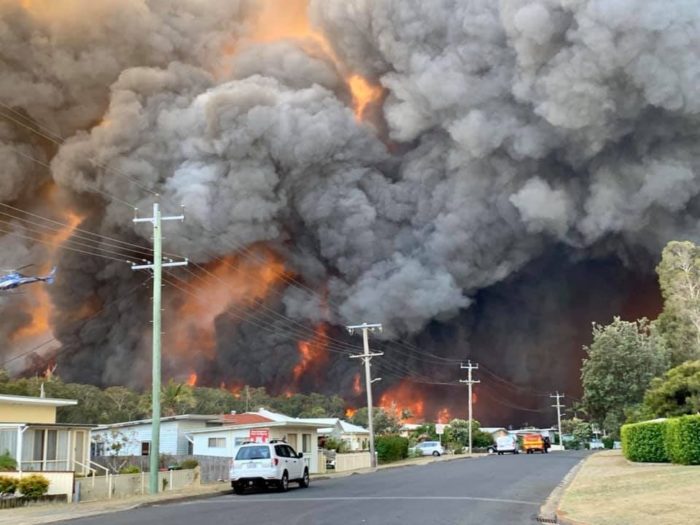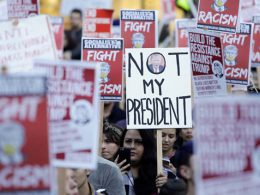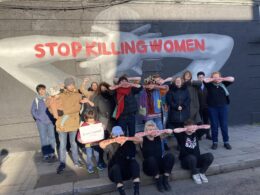By Jeremy Trott, Socialist Action (our sister organisation in Australia)
Australia is in the grip of an extreme bushfire crisis. Record-breaking heat waves and months of drought have created the conditions for massive blazes across the country.
The scale of the fires is unprecedented, affecting every state on the continent. They are the largest bushfires ever recorded in Australia. At the time of writing, almost six million hectares have burned – over five times the size of the 2019 fires in the Amazon rainforest. Fifteen people have been killed and the death toll is likely to rise.
For weeks on end a haze of toxic smoke has engulfed Sydney, Brisbane and Canberra. On most days air quality is worse than Beijing. In the first two weeks of December, dozens of Sydney offices were evacuated when indoor fire alarms were triggered by smoke creeping inside. Ambulance call-outs for respiratory difficulties jumped 30% in the same period.
As this disaster unfolds, the Liberal-National coalition government is asleep at the wheel. Like Emperor Nero fiddling while Rome burned, Prime Minister Scott Morrison holidayed in Hawaii during a state of emergency, prompting widespread public condemnation. To many people, Morrison’s holiday summed up the callous attitude of a government that refuses to do anything about global warming even as its effects become undeniable.
For decades scientists and fire experts have warned that climate change will exacerbate bushfires in Australia. These warnings are now a reality. The bushfire season is lengthening, with reduced rainfall and longer, hotter summers. Conditions are so dry that vegetated areas are like giant tinderboxes. Alongside greater frequency and intensity of fires, it means reduced opportunity for small, controlled burn-offs to manage bush undergrowth.
Australian capitalism and its politicians have done nothing to prepare for this situation. Firefighting in rural Australia is performed predominantly by thousands of unpaid local volunteers, sacrificing their time – and sometimes their lives – usually without compensation. Starved of government funding, volunteer firefighters often rely on community fundraising efforts to provide basic supplies. Both the Queensland and New South Wales Rural Fire Service faced budget cuts shortly before the 2019 fire season. These cuts cost lives.
While forcing crucial fire services to run on a shoestring budget is criminal, the political establishment’s biggest crime by far is its climate policy. Servants to the greed of the fossil fuel industry, both the Liberal and Labor parties have expanded gas and coal production instead of taking rapid action to transition to renewable energy. Their bipartisan support for coal mining in Queensland’s Galilee basin is the most glaring example. They blindly follow the logic of the capitalist market: short term profits no matter the cost.
Time for a fightback
40,000 people took to the streets in Sydney in December to protest the lack of action by the federal and NSW state government. This mass mobilisation is indicative of the simmering anger in society that must be harnessed to build a serious movement capable of transforming the situation.
In addition to more student strikes, trade unions need to spearhead this movement by stepping up to organise collective workplace action. Walk-offs by construction, maritime, and electrical workers in Sydney have already taken place on health and safety grounds in response to the toxic smoke.
These small-scale stop-work actions should be escalated into a national strike of workers and students to demand immediate funding for fire services and action on climate change. A mass strike and protests to shut down the economy for even one day would put immense pressure on the government.
Ultimately, dealing with the climate crisis and its disastrous consequences requires a radical restructuring of the economy. It is clear that as long as society’s wealth, resources and industries are privately owned, corporations will put their own profit interests ahead of the interests of the community.
To even begin tackling this emergency we need public ownership and control of the key parts of the economy. For example, if we brought the big oil, gas and mining companies into public hands we could begin a planned transition to renewable energy. Instead of cutting jobs, workers in those industries could be retrained and deployed to sustainable jobs elsewhere.
We cannot rely on the private sector to make important decisions about our environment and livelihoods. A democratic socialist plan of production, involving workers in all sectors, is urgently necessary. Climate change poses huge challenges – capitalism cannot meet them.












